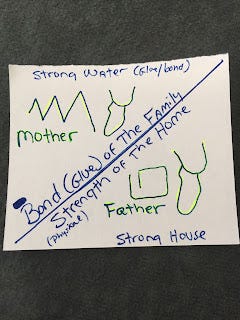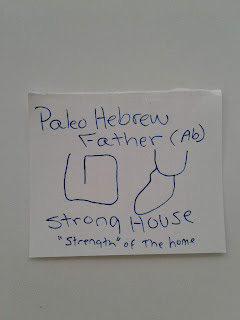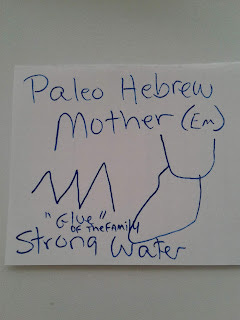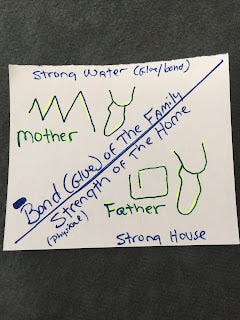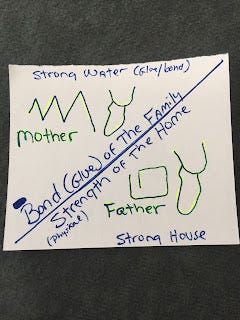The [often] pictorial language of written ancient Hebrew (Paleo-Hebrew) is incorrectly interpreted and referenced [by many] to prove that patriarchy is divinely mandated by God and not an unbiblical consequence of The Fall.
One basis for this claim is that many consider Hebrew to be a pure language—the original language spoken by the world population before the languages were confused at Babel.
Such a claim is spurious at best but is used nevertheless to refute the argument that patriarchy and not divine decree influenced the androcentric [male-centered] evolution of the Hebrew language.
Hebrew, like all languages, is a patricentric (father-centered) and androcentric language.
Patricentric scholars largely find acceptance of their views because few "regular folks" feel qualified to challenge the experts. But it does not take much digging to expose the flaws and errors in patriarchal/complementarian reasoning and scholarship, errors which are bottle-fed, spoon-fed, force-fed, and literally crammed down the throats of God's people from cradle to grave.
This is wrong. And it is time to stand up to such scholars and expose their "wisdom" for the foolishness it is.
A good place to put the boot to patriarchal reasoning is at the beginning of the Hebrew alphabet, where the Paleo-Hebrew letter "A" was symbolized by an ox, which biblically represents "strength." The Bible speaks of the “strength” of the ox. And it is more than telling…that this strength was applied to both parents in the first commandment.
The first commandment came with a promise connected to honoring both parents—mother and father.
The first letter in the spelling for both parents [in the Paleo-Hebrew] is the same—the ox—representing strength…in the mother as well as the father.
Both parents represent strength.
The command to honor both parents equally is not an either/or proposition. The practice of elevating one over the other has resulted in weakening and warping the family unit and the polarization of women and men—pitting even women against other women as well as pitting men against women.
This must stop.
A Lay-Person's Lesson in Paleo-Hebrew
No one argues that the first letter of the Paleo-Hebrew alphabet is the symbol for the ox. Likewise, no one argues that, biblically, the ox represents strength.
All things being equal, in the Paleo-Hebrew, the first letters of the words mother and father both begin with strength, symbolized by the ox—the letter "A" for AB [father] and the letter “A” for AM/EM [mother]).
Both parents, as symbolized by the ox, are strong. Both are the strength of something.
The Paleo-Hebrew letters that form the word "Ab," [Father] are Aleph and Bet "אָב," which literally translate as, "Strong tent/house" meaning physical strength of the house [home].
Patriarchal/complementarian scholars point to this as iron-clad proof of God-ordained husbandly governance over wives.
This writer agrees that "Strength of the House," is a great translation of these two letters...and they are [or should be] literally true... but in the physical sense only.
Might does not make right.
Physical strength does not denote God ordained gender-based domination.
Physical protector? We certainly hope so. No argument here that women and children are generally in greater need of physical protection than men.
But throughout all history, what should be the safest place on earth—the home—has experienced almost unrestrained havoc produced by an unbridled sense of male-entitlement, based only upon superior physical strength.
But this should not have been, and must not be, so among the women and men of God, who has called his men to submit their superior physical strength to him...in humility, love, and the task of renewing their minds daily through the reading his Word, which foretold the sin of male dominance over his physically weaker female counterpart.
Gender-based hierarchy is a horrific consequence of The Fall, a description rather than a prescription.
The sin of dominance is not a blessing to or promotion of men but rather part of the overall devastation sin introduced into a pristine creation.
MIGHT does not make RIGHT
The Paleo-Hebrew letters, Aleph and Mem "אֵם") form the word "AM/EM" for "Mother." They literally translate as "Strong Water" (bond or glue), meaning the strong bond of the family. The strong glue of the family. So, we see that the symbol of the ox (meaning "strength") applies to mothers as well as fathers. It takes the strength of both to produce harmonious and happy families…and by extension, harmonious and happy societies.
Taking care not to take the following statement in an either or stereotyping of fathers and mothers, the Paleo-Hebrew portrays fathers, in a perfect world, as being the physical strength of their homes, natural physical protectors of their wives and children. Likewise, the Paleo-Hebrew portrays mothers, in a perfect world, as being the emotional strength of the family, contributing in a greater [though not more important] way to the strong emotional bonds that glue families together and together, mother and father, were created to raise emotionally healthy children who know they are loved and protected.
Both strengths, portrayed in the Paleo-Hebrew, of Ab and Em are equally necessary. Though scholars consistently disregard the strength of the mother while simultaneously over-emphasizing the strength of the father. This has unduly influenced Christians to regulate women to lesser positions within the home [and within society in general].
In these days of broken homes, whether the father lives in the home or not, holding families together with a strong, loving, emotional bond [which is usually done by the mother] is every-bit as important as holding the family together by protecting them physically. That may look different in modernity than it did in antiquity but still holds true, nonetheless. This doesn't mean fathers don't play important parts in the emotional health of families. They do. In the same way, mothers are known to be fierce physical protectors of their children. and when either parent is missing from the home, the entire family can suffer catastrophically. But neither parent is more or less important than the other.
So, which is more important, "אָב", the physical strength of the home or, "אֵם", the strong emotional glue of the family?
Without both, everyone suffers. Likewise, even in unbroken homes, when, "אָב", the physical strength of the home marginalizes the importance of, "אֵם", and subjugates the strong glue of the family, everyone suffers.
This article addresses intrinsic, God-given, strengths and gifts--not roles. Roles are artificial mandates, whereas the gender-based strengths of Ab and Em, as portrayed in the Paleo-Hebrew, are innate gifts bestowed by God.
Facts are facts. Men generally have more physical power than women, and women are generally more empathetic and emotionally responsive than men. These are both portrayed, biblically, as equal and complementary strengths. Without both, family bonding would be difficult if not impossible. Of course, there are always exceptions to every rule. There are physically strong women as well as incredibly nurturing and empathetic men. There are overlapping strengths in both sexes, as is should be.
So, how much is nature and how much is nurture? Who knows? Everyone, regardless of sex, is influenced by both, but to deny that men in greater numbers than women gravitate towards and excel in pursuits of physical prowess and that women in greater numbers than men gravitate towards and excel in pursuit of relationship and communication, would be ignoring not only the obvious but history and modern statistics as well.
Women and men are not the same, but they are equal counterparts, and not just spiritual equals as complementarians teach. Nowhere in scripture do we read of mandated gender-based restrictive roles.
Nature and nurture arguments aside (I devote an entire chapter on this in my book), the Paleo-Hebrew symbols for Mother and Father, show that it takes a functionally equal family partnership between the physical strength of the home and the emotional glue of the family to create and maintain a loving and safe environment that is optimal for the happiness of the whole family and in raising emotionally healthy children.
This writer was a stay-at-home-mom...by choice—not by mandate. There is no such biblical mandate for women. Mothers are generally the glue of the family whether they hold jobs outside the home or not, and it is wrong to criticize or condemn working mothers.
Positioned side-by-side, Ab and Am/pronounced Em [as portrayed in the Paleo-Hebrew] create a perfect picture of equality/autonomy of the sexes.
Physical strength, is not a "role." It is simply a physical fact. Men possess physical strength in greater numbers than women. The strength to bind people together in their hearts as family, is not a "role." It is an inherent and God-given gift—which women tend to possess in greater numbers than men.
There is no place in Christian lives for play-acting "roles." Roles are for actors in movies, TV shows, or stage productions. In God, we live and move and have our beings...not live and move and play our roles.
Playing roles is affected and forced…a sick and twisted view of God’s created mandate for his human creation to manage the world’s resources together, as functional equals.
Through playing "roles," love is warped and morphed [by unbiblical teachings about gender-based authority and submission] into a mere and sometimes bizarre and dangerous caricature of what it should be. Through the obligatory playing of "roles," love is sometimes lost altogether.
If we are unsure about what love should look like, read 1 Corinthians chapter 13, or just take Jesus' advice about loving others as ourselves. That was his only rule, and our only role.
It cries out to be said, at this point, that men who would be God, view women as fundamentally hostile, controlling, and unloving. This is the complementarian "Evil Woman" doctrine first posited by Susan T. Foh in her 1975 book, What is a Woman's Desire?. According to Foh's teaching, women must be strictly and strongly kept under subjection (controlled) or the "Amazon warrior" in them will rise up, prevail, and destroy all life as we know it. Foh's view is the one promoted by the Council on Biblical Manhood and Womanhood and is part of the Danver's Statement that launched the complementarian movement in 1987 (it goes without saying that unmandated patriarchy began in the Garden with the first man, and not with our Creator).
Yikes! Such strength ascribed [by Foh] to weak and foolish woman. She must be a fearful creature indeed.
Back to Ab and Em, if a Hebrew instructor is complementarian [and most of them are], one of the first things his students learn is that the word for "father," [composed of two letters that mean strength of the home] translates into leader of the home. This is incorrect of course. The simple fact of having physical strength does not mean someone is automatically a leader. And it is rarely if ever pointed out that the Hebrew letters forming the word, mother are a perfect parallel to those that form the word for father.
According to a plain reading of scripture and, as portrayed in the Paleo-Hebrew alephbet, mothers and fathers are equal counterparts. We see that portrayed so beautifully in the strength of the ox...which is portrayed in the first letters of the words for both mother and father.
Biblical usage and mistranslation of "אֵם" (Am/Em mother)
The word "אֵם" (Am/Em), is consistently translated in our English Bibles as "mother," except for in one verse, where it is deliberately mistranslated. We find that in Ezekiel 21:21, where the Hebrew word mother is used to describe the head of two rivers, is translated as "parting."
What a radical departure from common usage.
This was likely done because the word, mother, in Ezekiel 21:21, is used in close association with the word, "head," [often associated with "leader"]. Now, that simply would not do—even if the verse is only describing the head ("mother") of two ways. Scholars would most surely have described it as the father of two ways, if that had been what the Hebrew text said. But, horror of horrors, the text said the “mother” of two ways, followed instantly by saying the mother of the ways was the head…. Sadly, most English Bibles are in agreement with the mistranslation of this verse and read: "...for the king of Babylon stood at the parting [mother] H517 of the way, at the head of the two ways...."
The decision, on the part of translators, to change the word mother to "parting," can only be ascribed to misogyny—the inordinate hatred and fear of women, because the verse correctly reads, "For the King of Babylon stood at the mother of the way, at the head of two ways..."
Can't have a mother described as a head of anything, not even a river. Correctly translating Ezekiel 21:21, would have been far too empowering for women and far too threatening to fragile male egos.
Strong men do not feel threatened by strong and empowered women. Strong men do not feel threatened by God’s Created Design of equality of the sexes.
Isn't it good to know that Paleo-Hebrew [when correctly translated] proves that gender-based hierarchical authority and submission roles were never created by God. But rather, his amazing design for his human creation is absolute and functional, divinely mandated, equality of the sexes—absolutely equal in adult autonomy.
Scholars who deliberately load the language against women, are not above giving false definitions and interpretations of the biblical words that all Christians base their faith upon.
Faith comes by hearing and hearing by the Word of God, and men who would be God, would change HIS Words and stoop even to stealing our faith.
Eclectic, edgy, and enlivening, Jocelyn Andersen is the author of several non-fiction books and is currently working on her first novel. She writes and speaks about a variety of topics with an emphasis on the subject of God and Women. Her work in that respect has been featured in magazines, newspapers, radio, and television.
When Jocelyn speaks at your church or event, toss political correctness and stuffy tradition out the window, and prepare be challenged and motivated. Whether she is speaking to writers, teaching a Bible study, talking about the gender-based Christian caste system, or Christian response to domestic violence, her talks and interviews are always compelling, informative, empowering, and inspiring.





